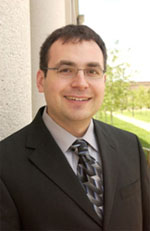Abstract
STAR-Vote is a collaboration between a number of academics and the Travis County (Austin), Texas elections office, which currently uses a DRE voting system and previously used an optical scan voting system. STAR-Vote represents a rare opportunity for a variety of sophisticated technologies, such as end-to-end cryptography and risk limiting audits, to be designed into a new voting system, from scratch, with a variety of real world constraints, such as election-day vote centers that must support thousands of ballot styles and run all day in the event of a power failure. This paper describes the current design of STAR-Vote which is now largely settled and whose development will soon begin.
Speaker
 Dan Wallach is a professor in the Department of Computer Science and a Rice Scholar at the Baker Institute for Public Policy at Rice University in Houston, Texas. His research considers a variety of different computer security topics, ranging from web browsers and servers through electronic voting technologies and smartphones.
Dan Wallach is a professor in the Department of Computer Science and a Rice Scholar at the Baker Institute for Public Policy at Rice University in Houston, Texas. His research considers a variety of different computer security topics, ranging from web browsers and servers through electronic voting technologies and smartphones.
About the WATCH series:
Transforming today's trusted but untrustworthy cyberinfrastructure into one that can meet society's growing demands requires both technical advances and improved understanding of how people and organizations of many backgrounds perceive, decide to adopt, and actually use technology. WATCH aims to provide thought-provoking talks by innovative thinkers with ideas that illuminate these challenges and provide signposts toward solutions. The series is jointly organized by NSF's Computer Science and Engineering (CISE) and Social, Behavioral, and Economic (SBE) Directorates and sponsored by the CISE Secure and Trustworthy Cyberspace (SaTC) Program. Talks will be recorded and made available over the Internet.
For technical questions during the webcast contact [email protected] or call one of our technical support numbers to the right. |
For the webcast, please tune in 15 minutes prior to the start time for the event and test your video player. This live event will be captioned in compliance with Section 508. The event will be archived for 3 months - viewable at http://www.tvworldwide.com/events/nsf/130926 and http://www.fededtv.com/. Participants should have the Windows Media Player or Flash player installed to view the event. (links to the webcast are in the upper-right corner of this page) |
About NSF
The National Science Foundation (NSF) is an independent federal agency that supports fundamental research and education across all fields of science and engineering. In fiscal year (FY) 2009, its budget is $9.5 billion, which includes $3.0 billion provided through the American Recovery and Reinvestment Act. NSF funds reach all 50 states through grants to over 1,900 universities and institutions. Each year, NSF receives about 44,400 competitive requests for funding, and makes over 11,500 new funding awards.MORE
Founded in 1999, TV Worldwide (www.tvworldwide.com) developed the first Internet TV network of community-based Internet TV channels, primarily targeting niche professional communities ranging from the Maritime industry to the Digital Media sector. Known by many in the industry as "Internet TV for Smart People", Fortune 500 companies, 18 federal government agencies, and numerous International associations including the National Association of Broadcasters, utilize TV Worldwide's live and archived state-of-the art video streaming content applications and Internet TV channels. In recognition of the company's unique achievements in new media, TV Worldwide was selected by the National Academy of Television Arts and Sciences (NATAS) to webcast the Daytime Emmy Awards and the Emmy awards for Technology and Engineering 2007 through 2009. CEO Dave Gardy has been honored by Streaming Media Magazine in 2008 as one of the 25 Most Influential People in Streaming Media. Mr. Gardy also currently serves as the President of the International Webcasting Association (IWA) (www.webcasters.org).